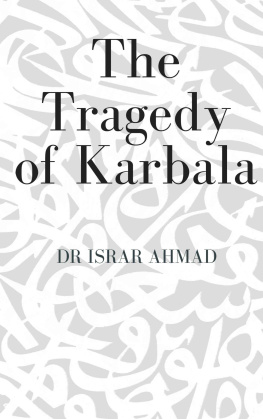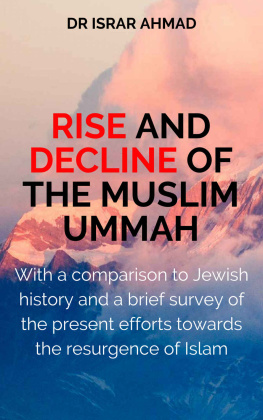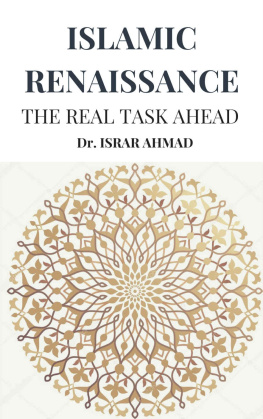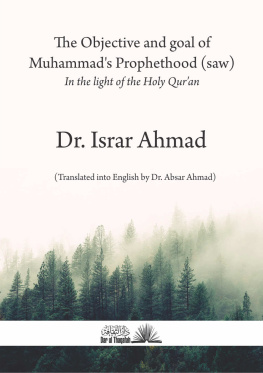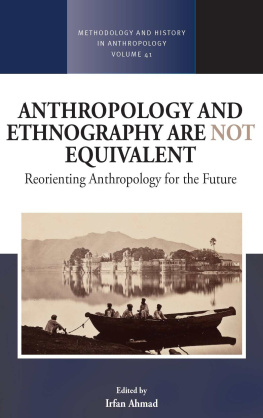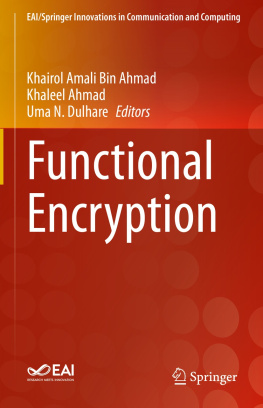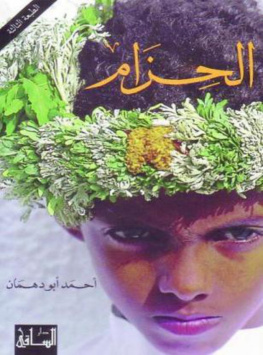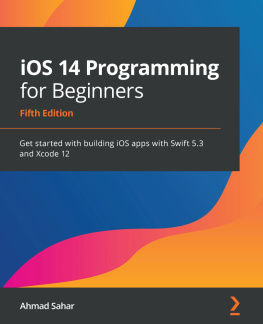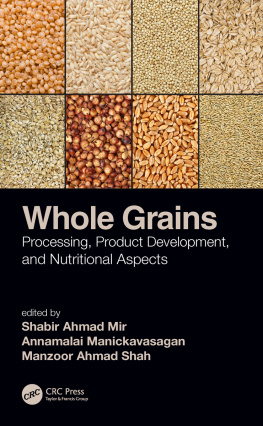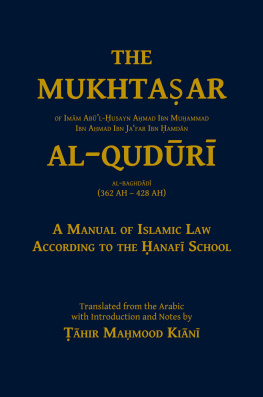Israr Ahmad - The Tragedy of Karbala
Here you can read online Israr Ahmad - The Tragedy of Karbala full text of the book (entire story) in english for free. Download pdf and epub, get meaning, cover and reviews about this ebook. year: 2018, genre: Art. Description of the work, (preface) as well as reviews are available. Best literature library LitArk.com created for fans of good reading and offers a wide selection of genres:
Romance novel
Science fiction
Adventure
Detective
Science
History
Home and family
Prose
Art
Politics
Computer
Non-fiction
Religion
Business
Children
Humor
Choose a favorite category and find really read worthwhile books. Enjoy immersion in the world of imagination, feel the emotions of the characters or learn something new for yourself, make an fascinating discovery.
- Book:The Tragedy of Karbala
- Author:
- Genre:
- Year:2018
- Rating:5 / 5
- Favourites:Add to favourites
- Your mark:
- 100
- 1
- 2
- 3
- 4
- 5
The Tragedy of Karbala: summary, description and annotation
We offer to read an annotation, description, summary or preface (depends on what the author of the book "The Tragedy of Karbala" wrote himself). If you haven't found the necessary information about the book — write in the comments, we will try to find it.
The Tragedy of Karbala — read online for free the complete book (whole text) full work
Below is the text of the book, divided by pages. System saving the place of the last page read, allows you to conveniently read the book "The Tragedy of Karbala" online for free, without having to search again every time where you left off. Put a bookmark, and you can go to the page where you finished reading at any time.
Font size:
Interval:
Bookmark:
The Tragedy of Karbala
Translated by
Commander (Rtd.) Muhammad Tufail
Istinarah Press
www.maktabaislamia.com
info@maktabaislamia.com
www.facebook.com/everythingislamic
www.twitter.com/maktabaislamia
2018 CE 1439 H
Translation of the Qurn
It should be perfectly clear that the Qurn is only authentic in its original language, Arabic. Since perfect translation of the Qurn is impossible, we have used the translation of the meaning of the Qurn throughout the book, as the result is only a crude meaning of the Arabic text.
Qurnic verses appear in speech marks proceeded by a reference to the Surah and verse number. Sayings ( Hadith ) of Prophet Muhammad (saw) appear in inverted commas along with reference to the Hadith Book and its Reporter.
Although medieval Muslim historians undoubtedly give the impression that Islam has grown into a large number of sects (or parties, firaq ), most of these are not sects but legal and theological schools, as pointed out by orientalists like Goldzihr. Indeed, throughout the history of Islam one looks in vain for a sect based entirely on doctrinal differences. The doctrinal and theological extremes to which, for example, certain sufis and philosophers went --- let alone the Mutazila and even the Khawarij --- are obviously incompatible with orthodox teaching, and yet this by itself has given rise to sectarian developments. The criterion of the permissibility of a schism in Islam has, rather, been something that can perhaps be best called community solidarity, and has been characteristically concerned from the beginning with practical and above all political issues.
The Shiah constitute the only important schism in Islam. Unlike the Khawarij , who rebelled against the Ijma of the community at the practical level, the Shiah have, over the centuries, evolved a doctrine of Divine Right (both with regard to religious and political life) that is irreconcilable with the very spirit of Ijma . The occasion of the Shiah secession was also the political event of hostility between Hadrat Ali (ra) and his opponents, the Umayyads. After Alis (ra) assassination, the Shiah (party) of Ali in Kufa demanded that Caliphate be restored to the home of the ill-fated Caliph. This legitimist claim on behalf of Alis descendants is the beginning of the Shiah political doctrine. The motives that led to this curious legitimist claim on the part of the Kufan Arabs are not very clear, except the fact that certain southern tribes, in their traditional enmity against the Northerners, decided to champion the Hashimites against the ruling Umayyads, and also the fact that the Prophet (saw) had been from the Banu Hashim came to be easily exploited. This legitimism, i.e., the doctrine that the leadership of the Muslim Community rightfully belongs to Ali (ra) and his descendants, was the hallmark of the original Arab Shiism which was purely political. Monuments of this Arab Shiism are to be found today among the Zaydis of Yemen with their Shiah Imam, and in Morocco where the ruler is a decedent of the house of Ali (ra) but the religion is that of Sunni Islam. But already among the earliest Shiah partisans there were strong traces of a religious enthusiasm for Ali (ra) combined with the political motive, although there was not as yet the dogmatic extravagance that was to develop in the 2nd/8th and 3rd/9th centuries. The social struggles in early Islam, when the discontent of Persian clients (Mawali) was broiling against the ruling Umayyads, gave undoubtedly a further spur and quite a new turn to the socio-political activities of the Shiah .
Thus, we see that Shiism became, in the early history of Islam, a cover for different forces of social and political discontent. The fundamental religious impulse was derived from the violent and bloody death of Hussain (ra), Alis son from Fatima (ra) at Karbala at the hands of government troops in the year 61 A.H. (681 C.E.) whence the passion motive was introduced. This passion motive combined with the belief in the return of the Imam gives to Shiism its most characteristic ethos. From the very beginning, however, the practice of moderation and catholicity of spirit, which had created the Ahl al-Sunnah wal-Jamaah, i.e., the orthodoxy, developed into a theoretical and doctrinal principle, according to which although there can be no obedience to sinful command, yet the ruler should be obeyed even though he be unjust for an unjust ruler is better than lawlessness. Therefore the charge of conformism against the Ulama as a whole seems justified, and the principle of obedience even to a tyrant was often carried to its extremes. It is, nevertheless, true that this political wisdom of the Ulama has done a fundamental service to the community which cannot be underscored. For, under the cover of this principle, the Ulama exercised a stabilizing function in the political chaos especially after the break-up of the Abbasid Caliphate when the adventurer sultans had to, at least externally, observe the Shariah (whose guardians were the Ulama ) which checked their excesses and kept their rule generally humane.
The contents of this booklet mainly consist of a speech delivered by Dr. Israr Ahmad, Ameer of Tanzeem-e-Islami, on 8th of Muharram Al-Haram (the first month of the Islamic calendar). The speech was delivered in Darussalam Mosque, Lahore, and was later published in Meesaq , the monthly magazine and the organ of Tanzeem-e-Isalmi. After a persistent demand from the readers, the speech was published in the form of a booklet under the title Saniha-e-Karbala .
The substance of the booklet is an endeavor to reveal the real background of the tragedy of Karbala and to lay bare the events leading to a series of tragedies in the Islamic history. The tragedy taken in a distorted perspective has led to tremendous confusion about the conflicts of the Companions of the Holy Prophet (saw). It gave rise to a separate sect in Islam, the Shiah . It is necessary for every Muslim to be aware of the real background of the events in order to avoid distorted concepts about the Companions of the Holy Prophet (saw), as it is a part of our faith to show due respect to them all and consider everyone of them free from perversion of intention in their actions.
The Urdu booklet was translated into English by Commander (Rtd.) Muhammad Tufail. May Allah (swt) accept the efforts of the author and the translator and make it effective in dispelling misconception from the minds of Muslims.
Dr. Absar Ahmad
Director (Hon.) Quran Academy
In the Name of Allah, the Most merciful, the Most Beneficient
On the 10th of Muharram Al-Haram, 61 A.H., a most abominable and tragic event occurred in the desert of Karbala that resulted in the martyrdom ( shahadah) of Hussain Ibn Ali (ra), the grandson of our Prophet (saw) and the son of his daughter, along with most of the members of his family and their supporters. It should be borne in mind that this tragedy did not take place all of a sudden like a bolt from the blue. It was in fact the manifestation of the plot of Sabayees which had claimed the life of Uthman (ra), the third Caliph and the son-in-law of the Prophet (saw) twenty-five years earlier. Caliph Uthmans (ra) martyrdom took place on 18th of Dhu Al- Hajj, 36 A.H.
We must not overlook the fact that the struggle between the forces of good and evil is a continuous process which never ends. In the history of mankind, evil has reigned supreme most of the time whereas the triumph of good has been sporadic and short-lived. Another well-established fact is that the evil forces, even if subdued and subjugated, never acknowledge total defeat. On the contrary, they become submissive for a while and lay low, waiting for an opportunity to strike back. Often the evil forces, when subdued, go underground but never abandon their struggle to cause rift and strife among their opponents. The Prophet of Islam (saw) brought about an incomparable and unprecedented revolution in the history of mankind, a unique miracle for all times, and established a state and government to dispense justice to the people over a vast tract of the globe. In the words of the Quran:
Font size:
Interval:
Bookmark:
Similar books «The Tragedy of Karbala»
Look at similar books to The Tragedy of Karbala. We have selected literature similar in name and meaning in the hope of providing readers with more options to find new, interesting, not yet read works.
Discussion, reviews of the book The Tragedy of Karbala and just readers' own opinions. Leave your comments, write what you think about the work, its meaning or the main characters. Specify what exactly you liked and what you didn't like, and why you think so.

